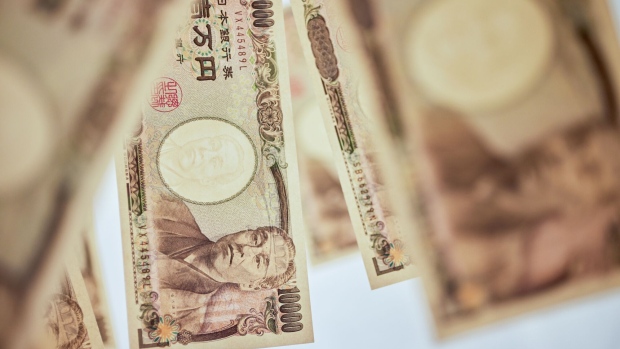Apr 5, 2024
Kishida Pledges Appropriate Action Against Excessive Yen Moves
, Bloomberg News

(Bloomberg) -- Japanese Prime Minister Fumio Kishida warned against the yen’s slide, pledging to act appropriately against excessive moves without excluding any options, in a continuation of the nation’s verbal defense against sharp moves in the yen.
Kishida spoke in a group interview with reporters on Friday with the yen not far from last week’s 34-year low against the dollar.
“It’s important for currencies to move in a stable manner based on fundamentals, and excessive volatility is not desirable,” Kishida said. “The government is watching the foreign exchange market with a sense of urgency, and we will act appropriately against excessive moves without ruling out any options.”
Read more: Japan’s Yen Intervention Strategy Faces Test From US Data
The prime minister’s indication that Japan is ready to resort to direct currency market intervention if needed comes with the yen weaker against the dollar than it was before the Bank of Japan raised interest rates last month for the first time in 17 years.
The comments, largely in line with similar warnings from last week, did little to strengthen the currency. The yen was around 151.34 late afternoon Friday, little changed from its level before Kishida spoke. Market players are more likely to respond to similar comments should the currency edge closer to last week’s low of 151.97.
A lack of aggressive rate-hike guidance by the BOJ has left investors expecting the central bank to wait longer before raising rates again. At the same time, the pushing back of rate-cutting expectations in the US means the gaping difference in interest rates between the two economies is expected to continue for the time being, an outlook that has fed into continued yen weakness.
That has left the currency vulnerable to sharp swings if US data such as Friday’s jobs figures show the economy continuing to run hot and further delaying expectations for a move by the Fed. More US data is due on Wednesday with inflation figures coming out just as Kishida meets President Joe Biden in Washington.
Kishida said his government will maintain close cooperation with the BOJ while he wants the central bank to be nimble responding to economic developments. The yen had gained some strength earlier in the day after a local media interview with BOJ Governor Kazuo Ueda indicated that the BOJ may raise rates in the latter half of the year. The central bank has repeatedly said that its policy focuses on generating stable inflation not targeting exchange rates.
Read more: BOJ’s Ueda Hints at Next Rate Hike in Second Half of 2024
The prime minister said Japan will adhere to its ongoing commitment to handle currency policy in line with a Group of Seven nations agreement that markets should determine currency levels. That agreement makes it difficult for Japan to enter markets in defense of a level such as 152 against the dollar.
In 2022, authorities in Tokyo spent around $60 billion to prop up the yen on three occasions. The weakest the currency reached during that spell was 151.95.
(Adds more comments from the prime minister)
©2024 Bloomberg L.P.






